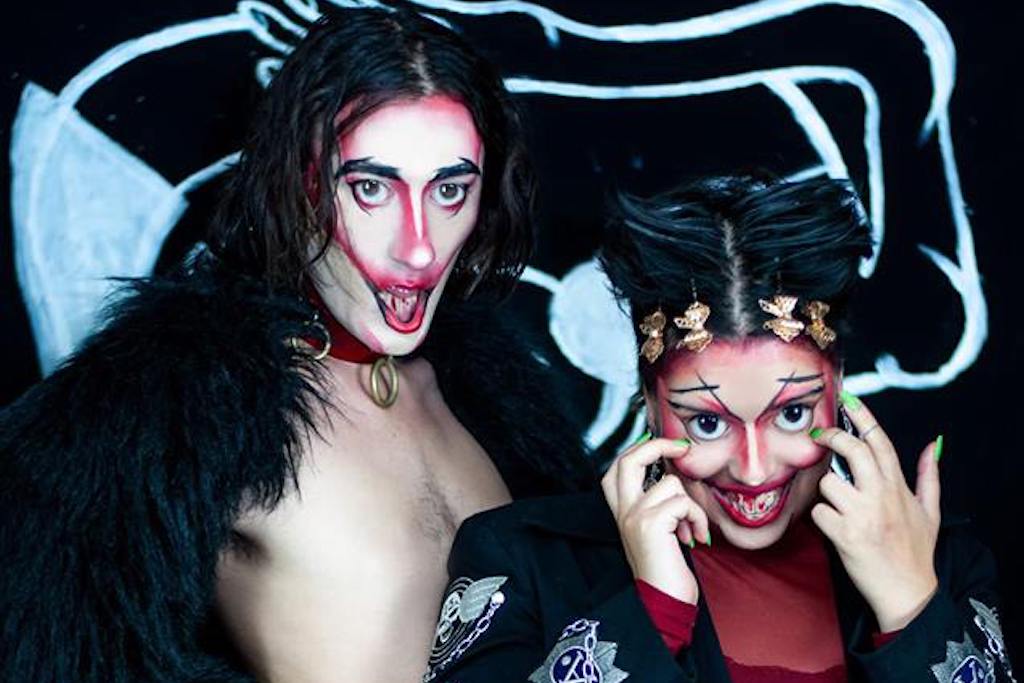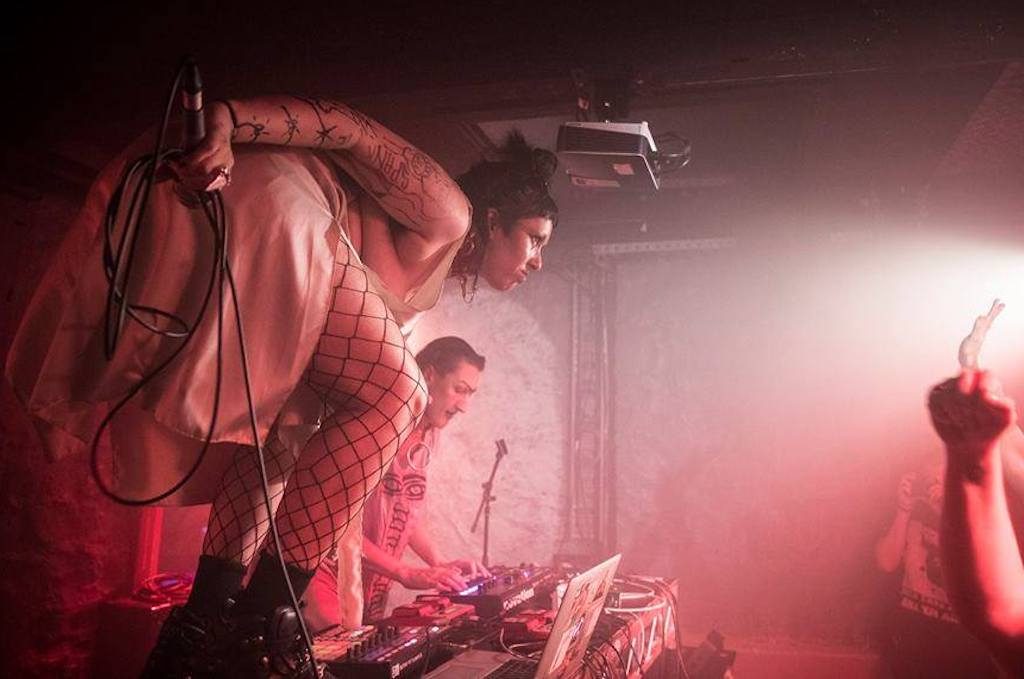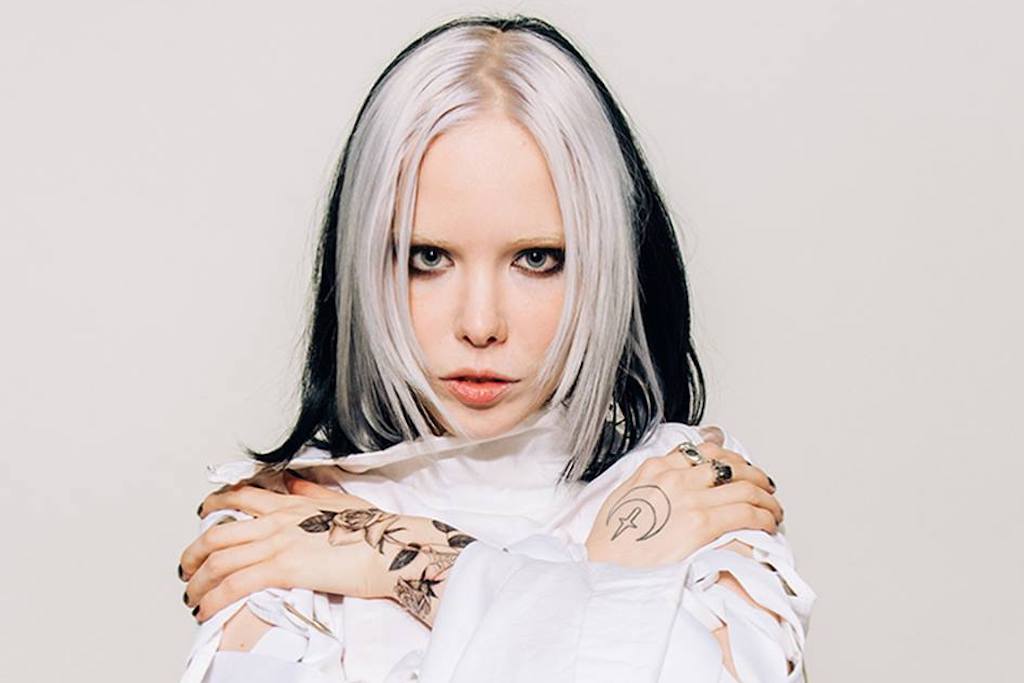Habits Want You To Check Your Privilege At The Door, Or Their Fist
"We were fed up with having experiences of feeling unsafe and erased."

If you think PC culture is corroding punk’s political power, you’ve never seen Habits scream “check your privilege at my fist” into a crowd.
That’s not to say the Melbourne duo are necessarily a punk band — there are far too many synths for them to fit easily into that definition. In fact, it can be a little difficult to categorise Habits: try too hard, and you’ll land on something naff and far-too hyphenated, like industrial-queer-RnB-electronica. So it’s best to follow the band’s lead, and stick with “sad goth party jams”.
With the release of sophomore EP Salty, Habits have established themselves as one of Australia’s most exciting electronic acts. Which you’d know if you’ve ever caught Mohini and Maia’s aggressive live shows, which can only be described as controlled chaos.
Habits is an exercise in taking up space — and taking it away from those who refuse to share. As songs shift between sparse production and industrial bass-lines, Mohini and Maia’s voices run between angelic and demonic, melodic and abraisive, demanding attention. The outfits and looks — the leather and lace, the beat (and sometimes bloodied) faces — don’t hurt, either.
That “check your privilege at my fist” lyric is from Salty opener ‘Selfie’, which Habits described as being “about the ways we are made to feel unsafe and disposable in our queer bodies and reclaiming our power in spite of it”. When the infectious hook — “I’m going to put a lipstick on/I’m going to take a selfie” — comes in, it sounds like a threat.
Maia and Mohini sat down with Music Junkee to chat about rubbing that saltiness back where it hurts.
You’re best known by your explosive live shows — what goes into them, behind-the-scenes? Do you design your own clothes?
Mohini: Well, we definitely do our own make-up, as I think you can tell.
Maia: There’s definitely stuff we wear that Mo’s [making], like leather harnesses, so we’ve been wearing a few of those. [But] we haven’t quite made it into the designing garments world yet.
…For me, it’s a catharsis. I think everyone in the world needs the opportunity to roll around and jump and scream into a microphone. We’re fortunate enough to be in a position where we get to do that — and it feels necessary. It’s like therapy. For me, there isn’t a lot of intention behind it, it’s just getting into that space and just making it your own.
[But] I used to get really nervous and not be able to look up. It took a few years of learning how to own the space [and] I think people want to see someone owning the space.
Mohini: I definitely need a few drinks to get up on the stage, [but] there’s a cathartic relief, really.
You’ve been performing variations of Selfie‘s tracks for years — how does it feel to have the EP finally out?
Maia: It’s very satisfying. It’s kind of funny how in this day and age, recording music. You have to really wanna do it. It’s just costs money and it’s such an agonising and slow process but I feel it’s a way of like, honouring the songs. We have been playing them for so long but at a certain point it was like, they deserve to be “immortalised in the annals of history”, or whatever.
It’s kind of like whenever there’s a Melbourne band that I love [with] songs that they’ve been playing for ages and then you get to finally listen to the recording and you go ‘ahh, that’s what they’re singing’ — It’s nice to provide that experience for someone else.
Well it’s good to be able to almost sit down with them because it’s very different live, it really washes over you.
Maia: Yeah. For sure. That’s kind of a weird thing for us because our live show is the main thing. The songs are important to us but the recording is an avenue for us to perform, you know?
And so it is really bizarre — the recording is a completely different thing all-in-itself. It’s separate from what the songs really are, and what they have been the whole time we’ve been performing them.

Via Habits Facebook page.
I wanted to ask about some of the ideas in the EP. To me, it felt that it was tied together with a sense of frustration and anger. What were you trying to express with Salty?
Maia: I think I hadn’t thought about it in those terms but I think that’s a very fair call. That’s why we called it ‘Salty’ — because we wrote these songs at such different points in our lives [and] we were struggling to find something that does tie them all together. Saltiness was the only thing — I guess saltiness is frustration and anger and bitterness.
That comes through in lead single ‘Selfie’, which details using anger to fuel your visibility.
Maia: I mean, we were just fed up with having all those experiences of feeling unsafe and erased. [Writing it] happened at a time where like there was a point in Melbourne’s music industry where people started to actually front up about toxic masculinity. We felt a bit more empowered to express those feelings, and feel like people would be able to respond to them.
That one came about pretty quickly — just because we were just feeling those frustrations right in our chest. Like right there, ready to go.
—
Header photo by Anita Shao.
—
Habit’s SALTY EP is out now.
—
Jared Richards is a Staff Writer at Junkee, and co-host of Sleepless In Sydney on FBi Radio. Follow him on Twitter.
